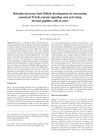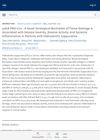 85 citations,
April 2012 in “PLOS ONE”
85 citations,
April 2012 in “PLOS ONE” Valproic Acid helps regrow hair in mice and activates a hair growth marker in human cells.
200 citations,
August 2009 in “Experimental dermatology” Eating high-glycemic foods and drinking milk may worsen acne by increasing insulin and IGF-1 levels.
 28 citations,
November 2018 in “Journal of Cellular and Molecular Medicine”
28 citations,
November 2018 in “Journal of Cellular and Molecular Medicine” CXXC5 is a protein that controls cell growth and healing processes, and changes in its activity can lead to diseases like cancer and hair loss.
 7 citations,
August 2021 in “Heliyon”
7 citations,
August 2021 in “Heliyon” Phyllotex™ extract was found to significantly promote hair growth and protect against hair loss.
3 citations,
June 2023 in “Molecules/Molecules online/Molecules annual” Cepharanthine has many medicinal uses but needs improvement for better effectiveness.
 August 2023 in “Journal of The American Academy of Dermatology”
August 2023 in “Journal of The American Academy of Dermatology” Early treatment is key for permanent hair loss disorders, with options ranging from medications and phototherapy to immunomodulators and antibiotics, depending on severity and type.
 April 2016 in “Journal of Investigative Dermatology”
April 2016 in “Journal of Investigative Dermatology” Mefloquine, an antimalarial drug, is effective in killing melanoma cells resistant to other treatments by causing lethal stress in the cells.
 10 citations,
January 2013 in “Journal of skin cancer”
10 citations,
January 2013 in “Journal of skin cancer” PKC ε increases hair follicle stem cell turnover and may raise skin cancer risk.
 January 2014 in “Journal of Investigative Dermatology”
January 2014 in “Journal of Investigative Dermatology” Proteins like aPKC and PDGF-AA, substances like adenosine and ATP, and adipose-derived stem cells all play important roles in hair growth and health, and could potentially be used to treat hair loss and skin conditions.
 July 2022 in “The journal of investigative dermatology/Journal of investigative dermatology”
July 2022 in “The journal of investigative dermatology/Journal of investigative dermatology” Silybum marianum extract, Manganese PCA, and Lespedeza capitata extract may help with hair growth and anchorage, potentially aiding in hair loss treatment.
 1 citations,
April 2018 in “Journal of Investigative Dermatology”
1 citations,
April 2018 in “Journal of Investigative Dermatology” Fzd2 is important for skin and hair development through various signaling ways.
 182 citations,
December 2017 in “Journal of the American Academy of Dermatology”
182 citations,
December 2017 in “Journal of the American Academy of Dermatology” Some treatments can help with a hair loss condition called alopecia areata, but none ensure lasting results; choices depend on the person, with JAK inhibitors showing promise for severe cases.
 2 citations,
June 2023 in “Indian journal of dermatology, venereology, and leprology”
2 citations,
June 2023 in “Indian journal of dermatology, venereology, and leprology” Janus kinase inhibitors can regrow hair in alopecia areata but may cause side effects and hair loss may return if treatment stops.
 1 citations,
September 2022 in “BioNanoScience”
1 citations,
September 2022 in “BioNanoScience” Tofacitinib can help hair grow back in alopecia patients but hair loss might return if the dose is lowered.
105 citations,
April 2014 in “Trends in Pharmacological Sciences” Targeting the Smoothened receptor shows promise for treating certain cancers.
 3 citations,
March 2021 in “Clinical, Cosmetic and Investigational Dermatology”
3 citations,
March 2021 in “Clinical, Cosmetic and Investigational Dermatology” Early treatment of Lupus Erythematosus Alopecia can prevent permanent hair loss, and various medications are effective.
 11 citations,
January 1997 in “Skin Pharmacology and Physiology”
11 citations,
January 1997 in “Skin Pharmacology and Physiology” A certain inhibitor can slow down the decrease in DNA creation in mouse hair follicles, which might help with hair growth.
 2 citations,
August 2023 in “Journal of the American Academy of Dermatology”
2 citations,
August 2023 in “Journal of the American Academy of Dermatology” New treatments for hair loss are emerging, and doctors need to learn how to use them effectively.
 88 citations,
July 2014 in “Journal of the American Academy of Dermatology”
88 citations,
July 2014 in “Journal of the American Academy of Dermatology” Targeted cancer therapies often cause skin reactions, so dermatologists must manage these effects.
14 citations,
June 2021 in “Journal of dermatological science” Argan press cake extract might help grow hair and protect hair cells from damage and inflammation.
 April 2016 in “The journal of investigative dermatology/Journal of investigative dermatology”
April 2016 in “The journal of investigative dermatology/Journal of investigative dermatology” RPGRIP1L helps skin cells stick together by blocking PKCβII, which can prevent skin blistering like in pemphigus.
 23 citations,
January 2018 in “International Journal of Molecular Medicine”
23 citations,
January 2018 in “International Journal of Molecular Medicine” Baicalin helps hair growth by activating specific cell signals and pathways.
 11 citations,
December 2018 in “Journal of the European Academy of Dermatology and Venereology”
11 citations,
December 2018 in “Journal of the European Academy of Dermatology and Venereology” Stopping JAK inhibitor treatment for hair loss can lead to worse hair loss than before the treatment.
 2 citations,
August 2020 in “Journal of Cosmetic Dermatology”
2 citations,
August 2020 in “Journal of Cosmetic Dermatology” Higher granulysin levels in the blood are linked to more severe hair loss in alopecia areata patients, and these levels decrease after effective treatment.
 4 citations,
January 2001 in “Archives of Biochemistry and Biophysics”
4 citations,
January 2001 in “Archives of Biochemistry and Biophysics” Activated ras can protect kidney cells from a certain substance that causes cell death.
 September 2024 in “Journal of the American Academy of Dermatology”
September 2024 in “Journal of the American Academy of Dermatology” PRO-C22 can help diagnose and monitor the severity of hidradenitis suppurativa.
 2 citations,
April 2022 in “Research Square (Research Square)”
2 citations,
April 2022 in “Research Square (Research Square)” Activating PKM2 and Wnt/β-catenin signaling together can potentially enhance hair growth and could be a treatment for hair loss.
 August 2023 in “Journal of Cosmetic Dermatology”
August 2023 in “Journal of Cosmetic Dermatology” Exosomes from hair papilla cells and the Chinese medicine Liao Tuo Fang can potentially promote hair growth and could be used to develop hair growth drugs.
 June 2024 in “International journal of molecular sciences”
June 2024 in “International journal of molecular sciences” Adenosine complex helps increase hair thickness and density in hair loss.
April 2020 in “The FASEB journal” Poncirin is a promising inhibitor of Janus Kinase 3, potentially better than tofacitinib.

























